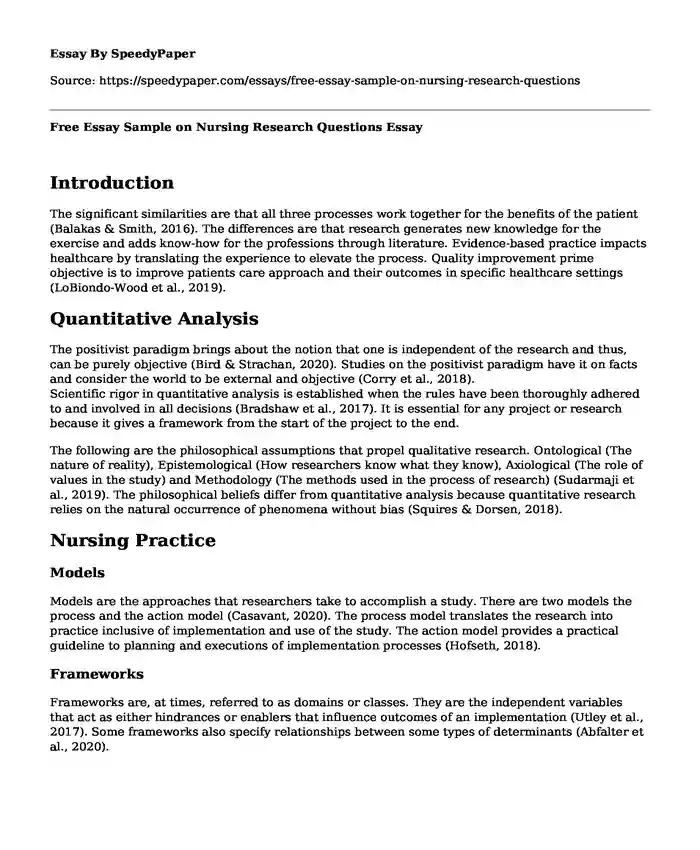Introduction
The significant similarities are that all three processes work together for the benefits of the patient (Balakas & Smith, 2016). The differences are that research generates new knowledge for the exercise and adds know-how for the professions through literature. Evidence-based practice impacts healthcare by translating the experience to elevate the process. Quality improvement prime objective is to improve patients care approach and their outcomes in specific healthcare settings (LoBiondo-Wood et al., 2019).
Quantitative Analysis
The positivist paradigm brings about the notion that one is independent of the research and thus, can be purely objective (Bird & Strachan, 2020). Studies on the positivist paradigm have it on facts and consider the world to be external and objective (Corry et al., 2018).
Scientific rigor in quantitative analysis is established when the rules have been thoroughly adhered to and involved in all decisions (Bradshaw et al., 2017). It is essential for any project or research because it gives a framework from the start of the project to the end.
The following are the philosophical assumptions that propel qualitative research. Ontological (The nature of reality), Epistemological (How researchers know what they know), Axiological (The role of values in the study) and Methodology (The methods used in the process of research) (Sudarmaji et al., 2019). The philosophical beliefs differ from quantitative analysis because quantitative research relies on the natural occurrence of phenomena without bias (Squires & Dorsen, 2018).
Nursing Practice
Models
Models are the approaches that researchers take to accomplish a study. There are two models the process and the action model (Casavant, 2020). The process model translates the research into practice inclusive of implementation and use of the study. The action model provides a practical guideline to planning and executions of implementation processes (Hofseth, 2018).
Frameworks
Frameworks are, at times, referred to as domains or classes. They are the independent variables that act as either hindrances or enablers that influence outcomes of an implementation (Utley et al., 2017). Some frameworks also specify relationships between some types of determinants (Abfalter et al., 2020).
Conclusion
Finally, theories are ideas created to explain scientific research. Some of the ideas come from psychology, sociology and business theories (Allen et al., 2019). Views provide a framework for nursing practice as they can be documented and used to support research in reaching a sound conclusion.
References
Abfalter, D., Mueller-Seeger, J., & Raich, M. (2020). Translation decisions in qualitative research: a systematic framework. International Journal of Social Research Methodology, 1-18. https://doi.org/10.1080/13645579.2020.1805549
Allen, C. G., Barbero, C., Shantharam, S., & Moeti, R. (2019). Is theory guiding our work? A scoping review on the use of implementation theories, frameworks, and models to bring community health workers into health care settings. Journal of public health management and practice: JPHMP, 25(6), 571. doi: 10.1097/PHH.0000000000000846.
Balakas, K., & Smith, J. R. (2016). Evidence-based practice and quality improvement in nursing education. The Journal of perinatal & neonatal nursing, 30(3), 191-194. doi: 10.1097/JPN.0000000000000197
Bird, M., & Strachan, P. H. (2020). Complexity science education for clinical nurse researchers. Journal of Professional Nursing, 36(2), 50-55.
https://doi.org/10.1016/j.profnurs.2019.07.007
Bradshaw, C., Atkinson, S., & Doody, O. (2017). Employing a qualitative description approach in health care research. Global qualitative nursing research, 4, 2333393617742282.
Casavant, S. G. (2020). At the intersection of science and theory: How the Nurse Role Integration Model reconciles the conflict. International Journal of Nursing Sciences, 7(3), 378.
https://doi.org/10.1016/j.ijnss.2020.06.005
Corry, M., Porter, S., & McKenna, H. (2019). The redundancy of positivism as a paradigm for nursing research. Nursing Philosophy, 20(1), e12230.
Hofseth, L. J. (2018). Getting rigorous with scientific rigor. Carcinogenesis, 39(1), 21-25.
LoBiondo-Wood, G., Haber, J., & Titler, M. G. (2018). Evidence-Based Practice for Nursing and Healthcare Quality Improvement-E-Book. Elsevier Health Sciences.
Squires, A., & Dorsen, C. (2018). Qualitative research in nursing and health professions regulation. Journal of Nursing Regulation, 9(3), 15-26.
https://doi.org/10.1016/S2155-8256(18)30150-9
Utley, R., Kristina Henry, D. N. P., & Smith, L. (2017). Frameworks for advanced nursing practice and research: Philosophies, theories, models, and taxonomies. Springer Publishing Company.
Cite this page
Free Essay Sample on Nursing Research Questions. (2023, Nov 24). Retrieved from https://speedypaper.com/essays/free-essay-sample-on-nursing-research-questions
Request Removal
If you are the original author of this essay and no longer wish to have it published on the SpeedyPaper website, please click below to request its removal:
Popular categories





